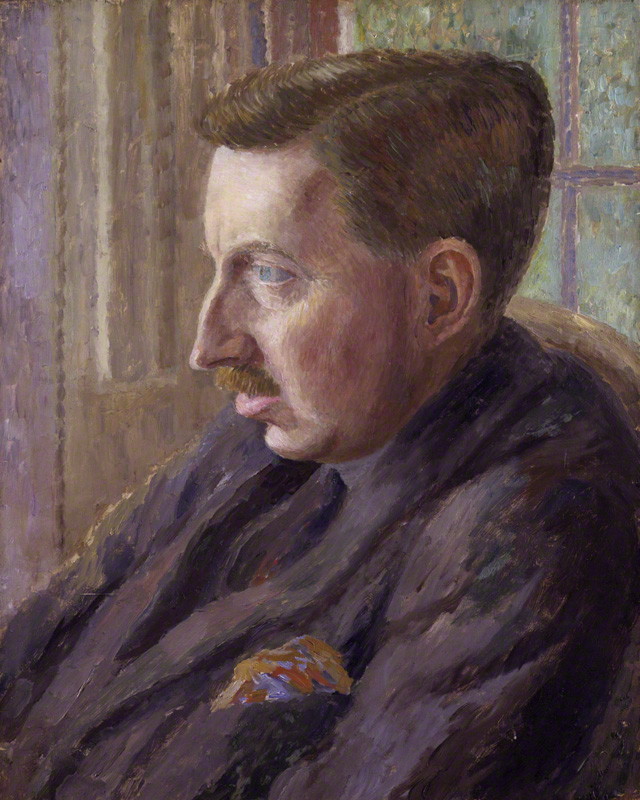Edward Morgan Forster Frases famosas
“A morte destrói um homem: a ideia da morte salva-o.”
Death destroys a man, but the idea of death saves him
Howards End (1910), Chapter 27
Works of art, in my opinion, are the only objects in the material universe to possess internal order, and that is why, though I don’t believe that only art matters, I do believe in Art for Art’s sake.
"Two cheers for democracy" - Volume 11, Página 95, Edward Morgan Forster - Harcourt, Brace, 1951 - 363 páginas
I should have been a more famous writer if I had written or rather published more, but sex has prevented the latter.
"The Life to Come: And Other Stories" - Página xiv, de E. M. Forster - Norton, 1987, ISBN 0393304426, 9780393304428 - 240 páginas
Edward Morgan Forster: Frases em inglês
Ansell
The Life to Come and other stories (1972)
Letter 104, to Forrest Reid, 19 June 1912
Selected Letters (1983-1985)
“One can run away from women, turn them out, or give in to them. No fourth course.”
Fonte: Commonplace Book (1985), p. 92
Letter 330, to Christopher Isherwood, 28 August 1938
Selected Letters (1983-1985)
Letter 419, to William Plomer, 12 December 1957
Selected Letters (1983-1985)
Letter 285, to George Thomson, 1 August 1931
Selected Letters (1983-1985)
What Does It Matter? A Morality
The Life to Come and other stories (1972)
"The Tercentenary of the 'Areopagitica'"
Two Cheers for Democracy (1951)
Well, taste for some reason or the other can't carry one far into the world of beauty—that reason being perhaps that though you don't want comradership there you do want the possibility of comradership, and A cannot swallow B's mouthful by any possibility:....and this exclusiveness (to maunder on) also attaches to the physical side of sex though not the least to the spiritual.
Letter 162, to Malcolm Darling, 1 December 1916
Selected Letters (1983-1985)
“Music is the deepest of the arts and deep beneath the arts.”
Harvard University Department of Music, Music and Criticism, A Symposium (May 1947; published 1948, p. 11 https://archive.org/details/musiccriticismsy00symp/page/10)
31-1-61
p. 224
Commonplace Book (1985)
Letter 60, to Robert Trevelyan, 28 October 1905
Selected Letters (1983-1985)
So I often reply to myself, and there rises before me my special nightmare—that of the writer as craftsman, natty and deft.
Letter 104, to Forrest Reid, 19 June 1912
Selected Letters (1983-1985)
“What puzzles me most is your criticism that he showed 'no sense of engagement.”
I haven't met the expression before, and feel bound to comment on its totalitarian tang. Engagement not with the truth as the speaker apprehends it, but with the alleged opinion of the majority of listeners.
Letter 400, to John Morris, 12 January 1953
Selected Letters (1983-1985)
But the horses didn't want it — they swerved apart: the earth didn't want it, sending up rocks through which riders must pass single file; the temple, the tank, the jail, the palace, the birds, the carrion, the Guest House, that came into view as they emerged from the gap and saw Mau beneath: they didn't want it, they said in their hundred voices 'No, not yet,' and the sky said 'No, not there.'
Fonte: A Passage to India (1924), Ch. 37
“There are moments when I feel Howards End peculiarly our own." "All the same, London's creeping.”
She pointed over the meadow--over eight or nine meadows, but at the end of them was a red rust. "You see that in Surrey and even Hampshire now," she continued. "I can see it from the Purbeck Downs. And London is only part of something else, I'm afraid. Life's going to be melted down, all over the world." Margaret knew that her sister spoke truly. Howards End, Oniton, the Purbeck Downs, the Oderberge, were all survivals, and the melting-pot was being prepared for them. Logically, they had no right to be alive. One's hope was in the weakness of logic. Were they possibly the earth beating time?
Fonte: Howards End (1910), Ch. 44
